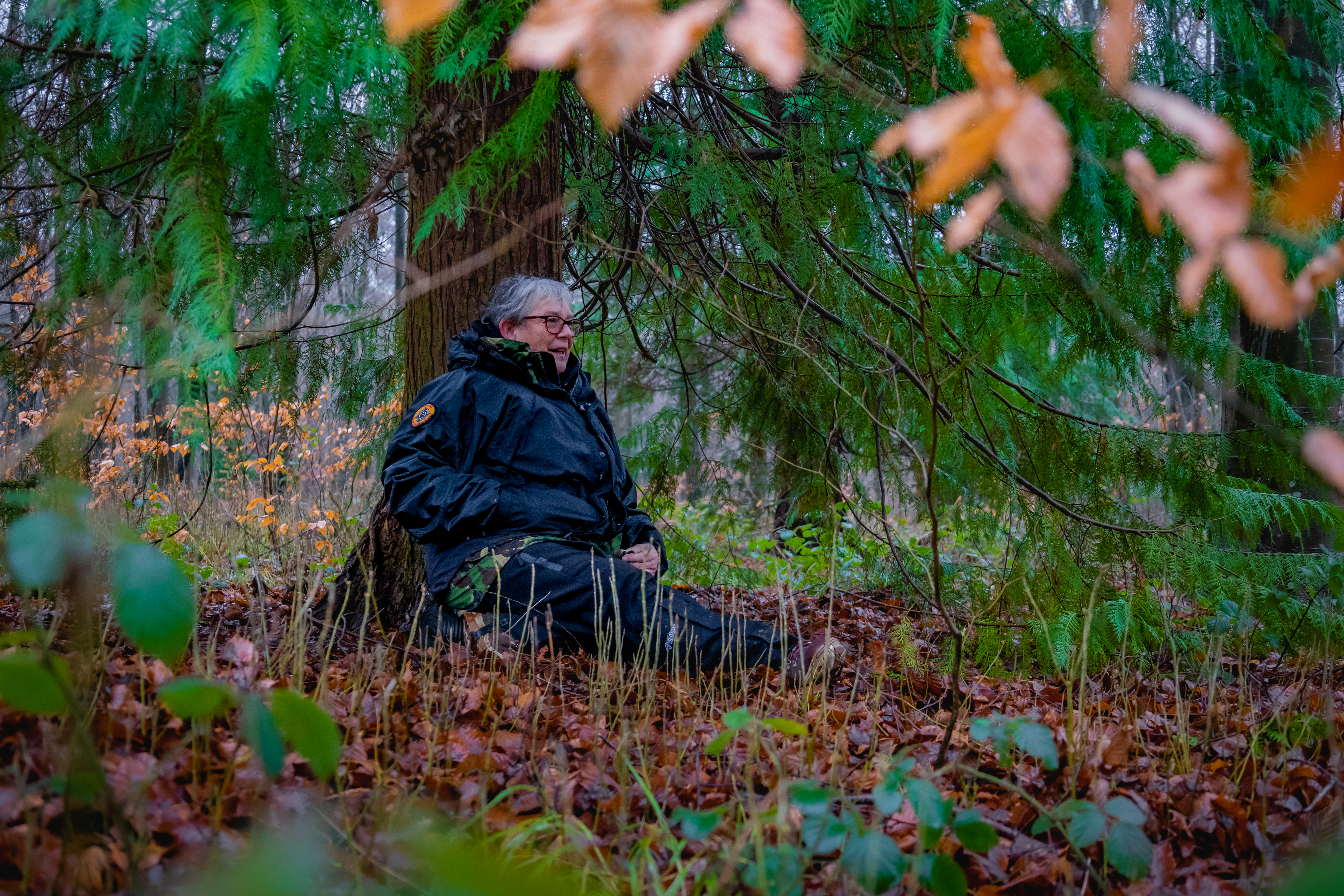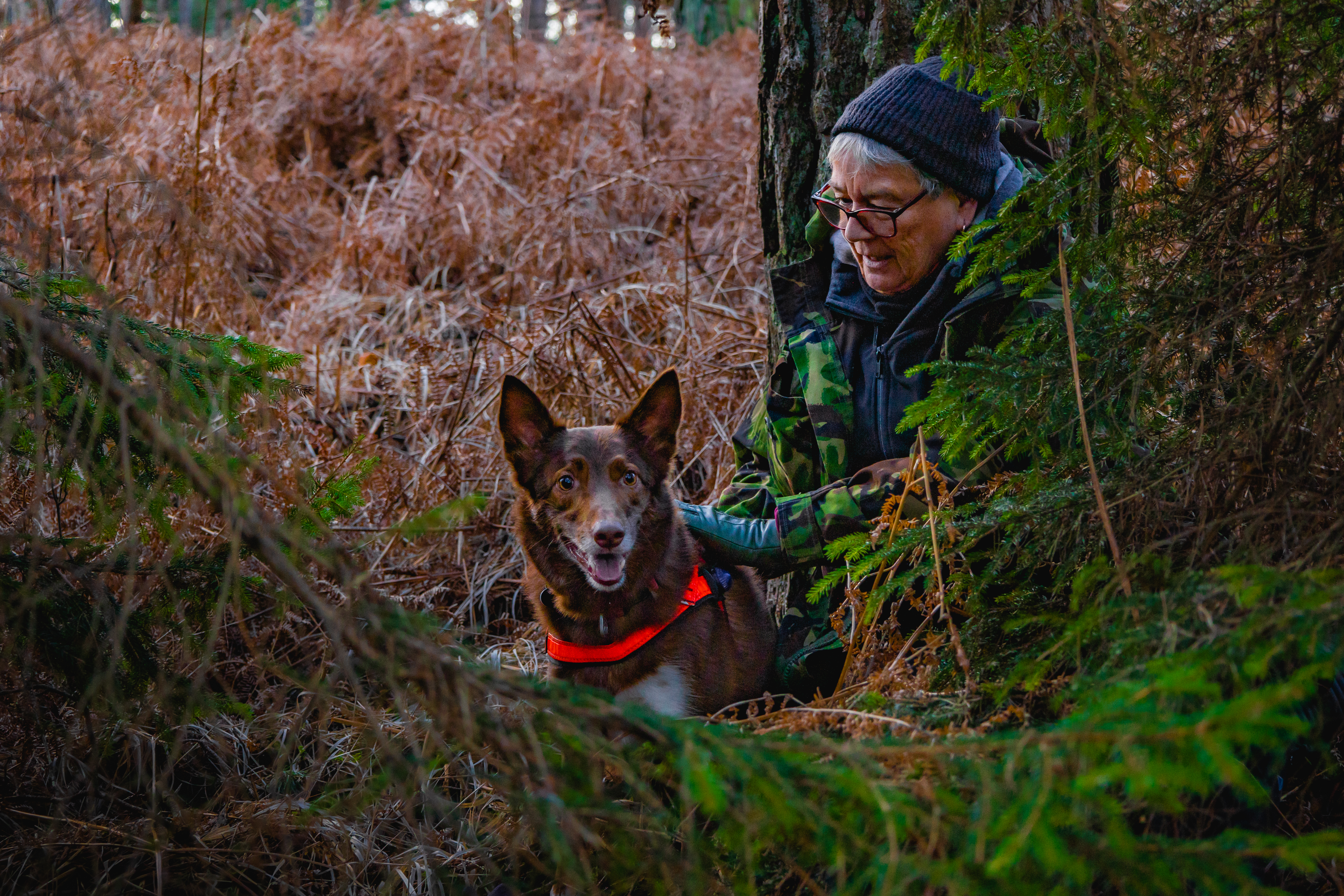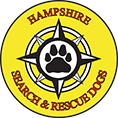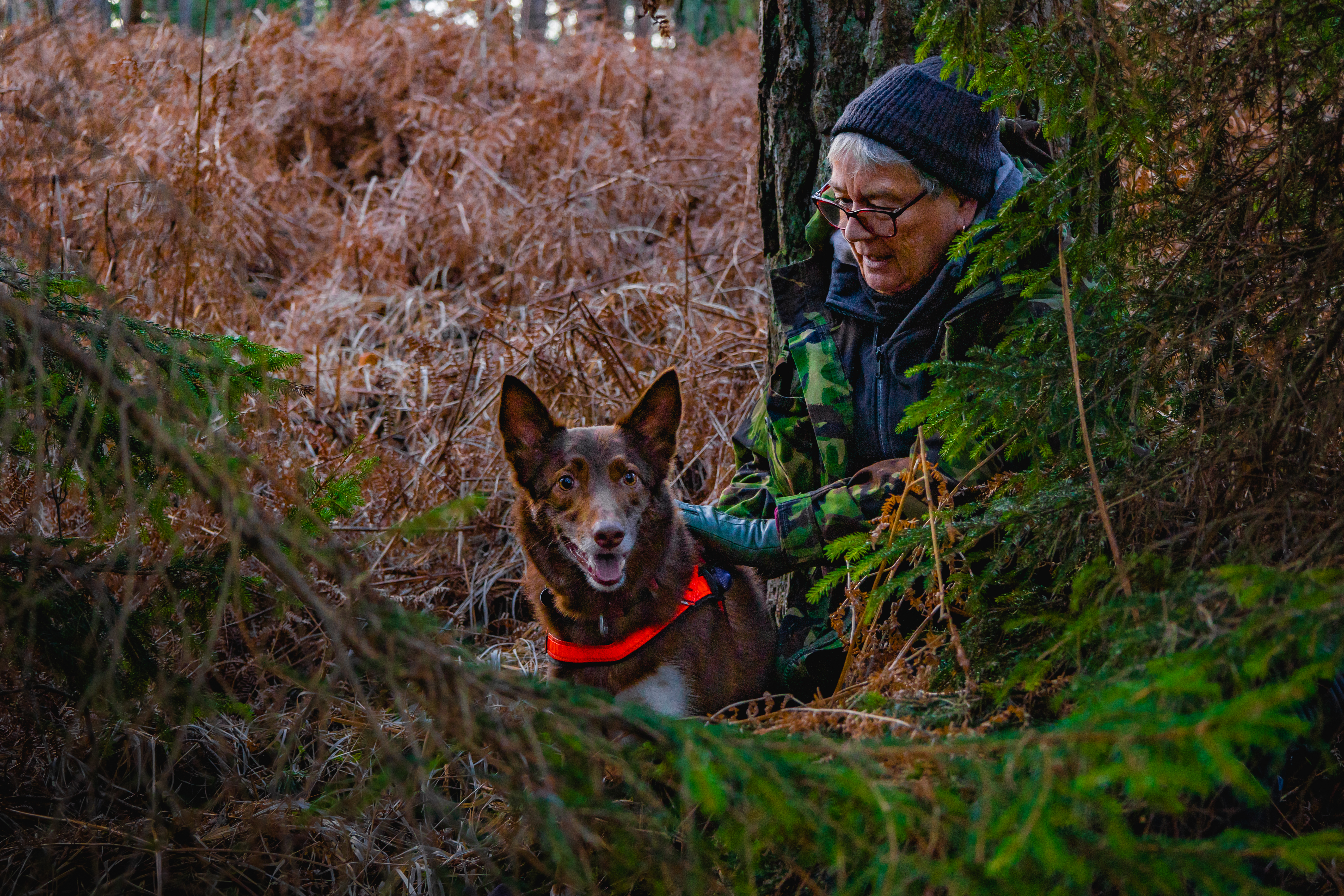HSAR Dogs training support Sash describes her first year volunteering as a training support for Hampshire Search & Rescue Dogs.
Driving home from training one Sunday afternoon in late October – when the rain was pounding on the roof of the car, thunder was almost shaking the ground and the lightning meant I nearly didn’t have to turn on the headlights – I realised I’d joined Hampshire Search & Rescue Dogs just over a year earlier. I started to think about my year. The team trains twice a week; for up to six hours on Sundays and every Wednesday evening for up to three hours. At the time of joining I had no idea what that actually meant but it sounded good. I would be helping to train dogs – odd for a cat person – and helping to save lives, and that ticked my ‘good person’ box.
I quickly learned that being a training support means so much more, and I am proud to be part of the team.
I arrived at my first training session at Blackwood Forest. There were about 10 (human) team members and five dogs all very visible in red and one large branded van. This area is known as the RVP, or rendezvous point.
Unbeknown to me I was entering the world of acronyms, callsigns, Control, the phonetic alphabet and seriously committed ‘professional’ volunteers. That said, everyone was very friendly and welcoming, and took the time to make sure I knew what to expect.
Before the day’s training got underway, one of the operational dog handlers gave a safety briefing and it was decided I would ‘body’ for Level 3 (area) Search Dog Rusty and his handler Kev.
Training supports are known colloquially in the team as ‘dogsbodies’ – the most accurate title in the word. It literally means that you are placed in the woods, where you stay hidden until the search dog finds you – simple.
As you leave the RVP with the team member placing the dogsbodies for the search dog you are given a radio check. I remember my first one very well.
Control: “Hotel Delta Control to Dogsbody Sash, radio check.”
Sash: Silence.
Control: “Hotel Delta Control to Dogsbody Sash, radio check.”
Sash: More silence.
I quickly learned that Control was checking that my radio worked, and that I needed to press the button and reply. My immediate thought was why would they give a newbie a broken radio – but of course the whole process was carried out to check that comms works in the woods, and that everyone can communicate with Control (and vice versa) should the need arise.
It took me a few weeks to learn how to use the radio confidently although I still have a tendency to laugh or say the wrong thing! However I now have a callsign – 06 – and occasionally I act as Control for the team’s session.
Back to training – I was hidden behind a tree and decided to lie down. What do I do for the next hour? Read a book and wait to be found? Well, not quite.
I now know that you need a yoga mat, a snack, a drink, wet weather gear, a small towel, personal first aid kit (although the team’s van – Petra – carries extensive first aid for dogs and humans), torch and other bits of essential equipment, all in a rucksack the size of a small horse.
The radio crackles into life: “We are commencing area search,” and the training session is underway.
The dogs wear bells on their harnesses and lights if it is dark: so you can hear and see them coming. When the dog sniffs you out, you may get jumped on, looked at, run past or gently licked before they go back to the handler to ‘alert’ that they have found a person.

The dog, its handler and the operational support then follow the dog back to you. You have been officially ‘found’. The dogs are rewarded with play via a toy which the handler gives to the dog. The fun part is you get to play as well, although it’s surprisingly strenuous work; lots of noise congratulating the dog, playing tuggy, throwing or kicking the toy away and generally making it a really exciting, high-energy rewarding game for the dog.
Our wonderful Search Dog Maya, a German Shepherd, is a strong girl and has been known to pull me over, before raising an eyebrow as if to say, ‘Please try harder, Sash!’ Almost all the dogs love to play with you after a find but Search Dog Rusty just likes a back rub.
Once you have been found you can either follow on to watch the remainder of the search (the dogs will find multiple people during a training search), or return to the RVP to body for other dogs. Of course the return to the RVP is easy if you have a sense of direction and I apparently don’t!
Evening training follows a similar pattern except it is often dark, obviously. You will be placed in the woods, alone, with just rustling, hooting, coughing deer and the occasional late night dog walker for company. You can be there for up to 90 minutes. Providing you are not spooked by the dark and the sounds of nocturnal wildlife, you are perfectly safe. You have your radio, you are counted out from the RVP and back in again, welfare checks are carried out by Control over the radio, and the person who places you tags your position via GPS on their mapping device.
We do this training in all weathers and all year round – in sunshine, rain, hail, frost, sometimes even snow. In fact any weather that is not hazardous to either the humans or the dogs. If the forecast looks like it could cause an issue – the heatwave of 2022 for instance – training will be cancelled or postponed. The safety of team members, whether two-legged or four, is paramount.
You can ascertain from all this that it’s important to be an outdoorsy person if you want to join the team!
Operational team members i.e. those who attend live callouts, are expected to attend a minimum of eight physical training sessions and two theory sessions every quarter, consistently. This is really important to keep up skills – navigation, first aid, water awareness etc. A huge amount of time and effort goes into training operational members of the team – not to mention the cost of the kit they are given to fulfil their roles comfortably and safely – and so it’s only right that members ‘give back’ in terms of their time and commitment.
Why am I not operational? An easy question to answer. I don’t have a dog, cats are impossible to train and I know I would become a liability on an active search. Speed = survivability and if the handler and dog are slowed down by me…well, it could be the difference between life and death on a live search.
Along with all our training supports, I make a big difference as a dogsbody or on Control. We enable the operational team members to train for their roles to the best of their abilities. They can focus on how to support the handlers, how the dogs search, and what each individual dog handler needs from their operational support to find missing people. Training supports are required to attend a physical training session a minimum of once a month – not onerous at all and extremely enjoyable.
I choose to attend nearly all the physical and theory training because I’m interested in learning but also I like being such an active member of the team. The team is made up of people from different backgrounds, jobs and walks of life, and each brings an array of skills.
It’s also fun! We are a supportive group of amazing volunteers who I am so lucky to have found and privileged to support in any way I can.

If you would like to find out more about becoming a training support or have any other questions regarding Recruitment please visit our Get Involved Page. We can be contacted via our Contact Page
-ENDS-
Notes to editors:
About Hampshire Search & Rescue Dogs
Hampshire Search & Rescue Dogs are a team of volunteers who are called out by the police to search for high risk, vulnerable missing people. The dogs and their handlers, together with supporting search technicians, are trained and assessed to national standards. All operational members of the team are on call 24 hours a day, 365 days a year. The team is a registered charity (number 1114740).
For further information please get in touch via the contact page.

